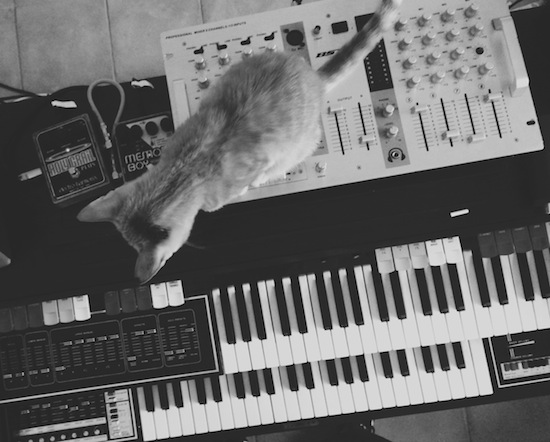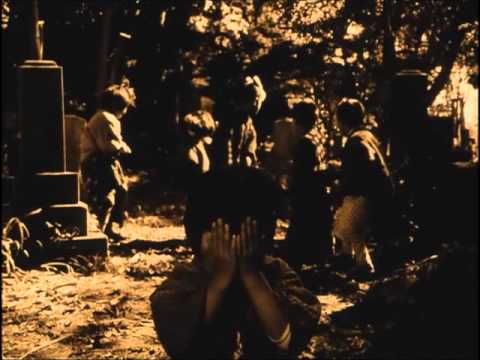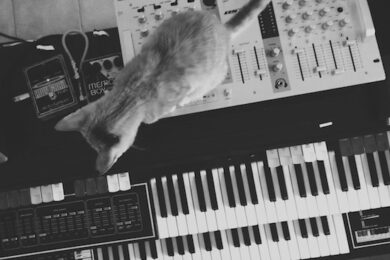Trudging through this endless mountain of new music – even having limited my pile to tapes alone – feels increasingly daunting with each passing month. Sometimes the image of Sisyphus springs to mind – the sinner doomed to push a boulder up a hill, watch it roll back down again, and repeat for all eternity in ancient Greek mythology. I couldn’t help but feel struck by the Iceland-based composer Ben Frost’s words on the subject (for a piece here on The Quietus published last month):
"…just so much fucking music. There’s too much. Unless you have something that really needs to be said, don’t fucking say it."
I couldn’t help but feel… it’s perhaps true, if more than a tad cynical. However, I keep going back for more. The love and care that goes into these tapes is always an inspiration. Siavash Amini’s contribution has had to travel so far to get pressed by Umor Rex – and through blockades against his Iranian home – the artist has in fact not even received a copy of his own tape yet. Tashi Dorji’s improvisations alongside Weightausend’s oddity of an EP are formative, and exploratory, and in that sense, they’re all the more bold. Daunting as it can seem, there will never be too much fucking music.
I’d best start pushing this boulder again.
Tashi Dorji – Blue Twelve
(Blue Tapes)
Bhutanese guitarist Tashi Dorji has already put out a handful of cassettes showing off his extraordinary acoustic guitar improvisations, and now the North Carolina-based Dorji switching to electric for the twelfth entry into the stellar Blue Tapes series. His acoustic improvisations attracted the attention and laudation of Ben Chasny, and later Sir Richard Bishop and Bill Orcutt. Orcutt’s own music has been perhaps the most familiar reference point when listening to Dorji’s previous, acoustic work – although only slightly. Dorji’s percussive, but with less of Orcutt’s abrasiveness, and more of the reflective gentillesse of Fred Frith’s most abstract prepared guitar improvisations. Dorji doesn’t plough through disseminated semblances of melody like Orcutt, but rather meditates on dissonant themes until memories of what melodies are ‘supposed’ to sound like get pushed aside, and Dorji’s unfamiliar tonal language starts making sense. Switching to electric has done little to quell Dorji’s percussive explorations, opening up a whole new facet to the instrument via volume control and amplification.
Blue Tapes’ twelfth is another triumph, and Tashi Dorji a tremendous new voice bringing together dissonance and melody in a fresh and unexplored middle ground. He’s perhaps the most exciting guitar improviser to emerge since the late, great Derek Bailey passed on, and like Derek Bailey, this music initially sounds like Hell. Listen closely though, and you’ll soon find heaven.
Weightausend – WGHTSND EP
(Haunter Records)
While the second side of this tape features two relatively standard (albeit beautifully executed) remixes that marry warm digital fuzz to bedroom-built techno beats, side A’s pair of original tracks explore dub-infused, echo-laden rhythms and sound effects themselves as musical building blocks. Whispers of sub-bass float in and out of the mix, but other than that it’s the tinkling of railings and snap of synthetic hand claps that engulf and destroy the listener here. Quantized and subsequently filtered through echo effects with mathematical precision, the aptly titled ‘The Cage’ builds from sparse emptiness to mazelike walls of skittering sampled sounds. ‘W Modulate’ winds things down a notch with languid drum samples that parallel Klaus Dinger’s classic slow-mo break used on Neu!’s ‘Super 16’, and manages to linger in the mind well beyond it’s five minute run time. Part Livity Sound and part Merzbild Schwet, Weightausend’s debut tape on the mysterious italian Haunter Records label is an intriguing oddity.
Faux Fur – s/t
(Faux Discx)
With Housewives’ fantastic contribution to the label, Faux Discx fermented a rep for finding the kind of intelligent indie that can often feel a thing of the past. This tape – another self-titled debut, this time from Calgary and not South London – is no exception. Lush arrangements of stridently performed, majestically composed jangly guitar pop lie therein, and although there are touchpoints aplenty, the high schoolers remain impossibly idiosyncratic. The stop-start bash of no wave is there in the rhythm section, but the songs are too sweet to stem from DNA or Lydia Lunch. There’s also something of Bradford Cox’s tragic teen-dom in Faux Furs’ own frontman, Jean-Sebastian Audet – ‘Saw You Standing’ could practically pass for a Deerhunter outtake – yet Audet’s weariness seems, if anything, already more fully formed than Cox’s ever changing musical manic depression, with the Calgarian barely wavering from his wide-eyed whisper throughout the record. Furthermore, Faux Furs’ inventive use of stripped back take on guitar interplay is some of the best since Bradford and Lockett Pundt – or Thurston and Lee for that matter – weaving interlocking lines that pull together the group’s disjointed song structures. The songs and their many intricacies reveal more with repeated listens – which there definitely will be. Faux Furs are undoubtedly making some of the best radio friendly indie going right now. What’s more they’re putting it out on tape.
AyGeeTee – Eternity’s Conceit
(Reckno)
The London-based AyGeeTee already came to my attention last year via the excellent ‘Fools’ full length on AMDISCS. That record’s 17 tracks cut between preludes of atmospheric synthesized sweetness and bedroom techno workouts that pulled together disparate elements of collagic abstract construction and danceable disco – it was full of promise, albeit a tad of a slog all at once. Eternity’s Conceit tightens up the producer’s compelling mix of beats and aural detritus, into two single monolithic 18 minute slabs. The tape’s closest cousin is perhaps Karen Gwyer’s drawn out psychedelic techno, although AyGeeTee’s stew is decidedly grungier and more chaotic than Gwyer’s more learned compositions. Taking up side one is ‘The Feed’, which builds from anonymous concrete ambience to a foot stomping techno march that peaks and falls hypnotically for the entire duration. SIde two’s ‘Conceit’ is far gentler, spending three quarters of its life gradually pulsating as it morphs from digital dream into nightmare, before ultimately collapsing into five final minutes of heavenly glitches. The familiar sound of the producer’s own trackpad clicking away at the beginning of ‘The Feed’ reminds us of how unbelievably true it still is that such fully realised universes can come into being from little more than musician and laptop.
Solvognen – IKB
(Disco Insolence)
This tape by Detroit resident, Solvognen (aka Daniel Llanes), is a beacon of truly delightful instrumental music from a city purportedly in a constant state of ebb. That town’s own history of bacchanal club music is all but absent from IKB‘s always pensive, often cinematic bedroom compositions. The beats are simplistic, lo-fi and low rent, and the music focuses on texture and tone, eschewing pinpoint precision in favour of broader musical strokes. The title track features a low-bitrate sample of chords bashed out behind a piano that gurgles and stutters a la Fennesz’s classic Endless Summer. ‘Amber’ harkens directly back to Boards of Canada’s earliest blend of beats and quivering atmospherics, while the bassy arpeggios at the heart of ‘Mauve’ evoke retro filmic darkness akin to Brad Fiedel’s enigmatic theme from Terminator, finally disintegrating into chaotic phasing fuzz. However, it’s ‘Wisteria’ that’s obviously stands out, putting to use mellotron VSTs to curl out a theme straight from the Klaus Schulze book of Kosmische. The leading synthetic cello meets a sea of synthetic strings for a harrowing mid-track peak that’s much more Irrlicht than Carl Craig. Though perhaps too often snatching from well established motifs in electronic music, the pervasive feeling of IKB is an uplifting one, and one that makes these six home-made miniatures from Solvognen worth hunting down.
Siavash Amini – Till Human Voices Wake Us
(Umor Rex)
Already established in Iran’s meagre (but increasingly active) underground music scene, Siavash Amini’s crafted a powerful signature sound that mixes impeccably assembled ambient synthesis with languid electric guitar melodies a la Lanois & Eno’s classic Apollo. On his first tape, and first release on a non-Iranian label, Amini’s guitar disappears deeper into the mix than it’s been previously, congealing into his densest soundscapes yet. From the very serious sounding T.S. Eliot quoting title, to the endless ocean of his sound Amini should almost be a cliche by now. However, the latent abstract textures on ‘Unreal City’, or the burgeoning glitches on ‘The Fog’, both testify Amini’s ability to compose as thoughtfully as his Western counterpart, Jon Porras of Barn Owl. As a result of economic blockades against Iran, it’s purportedly been far too complicated to get the tape shipped from the Umor Rex label’s home in Mexico City back to Amini’s home city of Tehran. Despite such difficulties, Amini’s already put out several essential releases for fans of far-reaching drone. This is his best yet, and from the looks of things, we can expect more to come.
Laplante/Dunn/Smith – Ancestral Instrument
(NNA Tapes)
The trio of Travis Laplante (Little Women) on sax, Trevor Dunn (Mr. Bungle, Melvins Lite etc.) on double bass, and Ches Smith (Marc Ribot, Secret Chiefs 3, Carla Bozulich) on percussion purportedly gathered in Brooklyn during one the harshest snowstorms of last December’s already harsh winter to play this set to the handful of punters who braved the elements in the name of free jazz. The players here are certainly known for virtuosity, but not so much as free improvisers (it is in fact Laplante’s debut free improv recording), which is surprising considering how immediately adept and fruitful the chemistry on the tape is. Laplante – whose Little Women picked up the baton of Ornette Coleman-influenced punk-jazz where Zorn left it after dissolving Naked City – is in particular a revelation, spewing wave upon wave of textural invention across the half-hour ‘Look Behind You’. His superhuman technique has been well documented on Little Women’s dynamic, often high energy albums, but Laplante’s sheer dextrous range – from Brötzmanian squeaks to Coltranian melodic rapid fire to John Butcher-esque extended breathing cycles, sometimes all in the same phrase – is something profoundly special to behold. Trevor Dunn and his bass are on typically brilliant and adaptable form, providing the necessary melodic pushes to keep things going whenever Laplante occasionally improvises himself towards a corner, while Smith’s an indispensable improvisational ally, allowing himself to be led where other percussionists often (and sometimes foolishly) would try to lead. Both sidelong pieces ooze tension, and eschew resolution, keeping us on tenterhooks which – during the extended strands of the bowed bass and sax duet on side two’s ‘Remember to Remember’ – at times reach an intimate intensity rarely heard in a genre that’s been all too aggressive of late. NNA Tapes has gradually built up a roster that’s impossible to argue with. Releases from underground heavyweights like Julia Holter, Oneohtrix Point Never, Laurel Halo and Wanda Group rank amongst the label’s former glories. But while Ancestral Instrument has the weight of its well known names to help launch it (well…Trevor Dunn mainly), subdued acoustic free jazz trios are far from the usual radar of the modern electricity-oriented listenership. As the handful of Brooklynites who braved the snow last December found out though, intense explorations such as this are as harrowing and indeed futurist as anything else, and definitely worth braving the journey.




